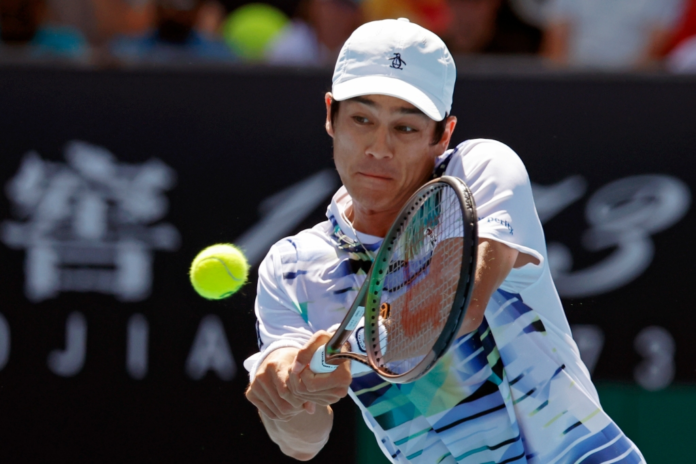By HOWARD FENDRICH
MELBOURNE, Australia — The string of upset victories by young American men continued Thursday at Melbourne Park, although Piedemont’s Mackenzie “Mackie” McDonald wasn’t able to extend his magical ride at the tournament into the round of 16.
McDonald was eliminated by No. 31 Yoshihito Nishioka 7-6 (6), 6-3, 6-2, two days after the unseeded 27-year-old stunned the sports world by beating No. 1 seed Rafael Nadal in the second round.
That was the biggest in a series of attention-grabbing victories by players from the U.S., whose men last won a Grand Slam title 20 years ago when Andy Roddick won the 2003 U.S. Open. A day after McDonald’s stunner, No. 65 in the ATP rankings, upset Nadal, Jenson Brooksby beat No. 2 seed Casper Ruud.
McDonald, whose next scheduled tournament is next month’s Dallas Open, was one of the eight U.S. men to reach the third round. No. 16 Frances Tiafoe also was eliminated on Thursday, and two more third-round matches are all-American: Tommy Paul vs. Brooksby and J.J. Wolf vs. Michael Mmoh.
But at least three Americans will be heading into the fourth round.
It was Sebastian Korda’s turn to add his name to the list of big U.S. winners — and earn a spot in the fourth round — on Thursday with a game Daniil Medvedev described as “kind of different from everybody.”
Korda, the son of 1998 Australian Open champion Petr, eliminated two-time runner-up Medvedev 7-6 (7), 6-3, 7-6 (4).
Kordao is a 22-year-old from Florida who is seeded 29th who equaled his best showing at any Grand Slam tournament by reaching the round of 16.
“I always was told how good of a tennis player I can be. Now (I’m) just getting the right people around me, building a really solid team, just trusting the process,” said the 29th-seeded Korda, who was the 2018 junior champion in Australia. “I’m growing as a person, as a player. Just trying to do the right things. Just have fun, enjoy it — good things will happen.”
Medvedev, the No. 7 seed, won the U.S. Open two years ago and made it to the final in Australia in 2021, when he lost to Novak Djokovic, and 2022, when he lost to Nadal after holding a two-set lead. The Russian also was briefly ranked No. 1 last season.
On this night in Rod Laver Arena, it was Korda who dictated most of the points, who put his shots right where he wanted them, who charged forward with verve and slick volleys. He even threw in the occasional drop shot, for good measure.
He compiled nearly twice as many winners as Medvedev, 50-28, and won the point on 75% of his trips to the net, 36 of 48.
“I kind of knew what I had to do. I stuck with it, even when I was going up and down with the emotions,” Korda said.
How would he describe that game plan?
“Just go for it,” he said with a laugh.
To reach his first Slam quarterfinal, Korda will need to defeat No. 10 Hubert Hurkacz on Saturday. That day’s other men’s matches: Stefanos Tsitsipas vs. Jannik Sinner, Felix Auger-Aliassime vs. Jiri Lehecka, and Karen Khachanov vs. Nishioka.
The women’s upcoming fourth-round matches: Iga Swiatek vs. Elena Rybakina, Jessica Pegula vs. Barbora Krejcikova, Coco Gauff vs. Jelena Ostapenko, and Victoria Azarenka vs. Zhu Lin.
As well as Pegula is playing, dropping zero sets and just 11 games total along the way to Week 2, you might think she’d be completely pleased with how things are going.
Ah, but Pegula is a self-described perfectionist. And so she gave herself a bit of a hard time about what happened late in the second set of her 6-0, 6-2 victory over Marta Kostyuk.
“I was annoyed,” Pegula said after the 65-minute contest.
By what, exactly?
Well, the 28-year-old from New York was cruising along, having won 10 of the first 11 games and serving with a 30-love lead, when she stumbled ever so slightly, ever so briefly. She missed three first serves in a row. She put a backhand into the net. She got lobbed. She double-faulted. She started muttering under her breath. She sent a backhand long to end an 11-stroke exchange. Add it up, and Pegula got broken there, her lead in the second set shrinking to 4-2. For three minutes, her play was less than ideal.
Oh, the horror.
“When I was younger, it came off as kind of a bad attitude. I’d get really negative or down on myself,” Pegula said, adding that she has worked on “not being so hard on myself during the matches.”
Memorable Australian Open run ends for Piedmont’s McDonald
Recent Comments
on Iowa State starting RB Jirehl Brock among latest college football players charged in gambling probe
on The Rev. Al Sharpton to lead protest after Florida governor’s ban of African American studies course
on Sports World Hails ‘Superwoman’ Lindsey Vonn for Her Grand Comeback Despite Career-Changing Injury
on San Mateo County Community College District sues five companies over role in ‘pay to play’ scandal
on Saipan, placid island setting for Assange’s last battle, is briefly mobbed – and bemused by the fuss
on ‘Pokémon Scarlet’ and ‘Violet’ Fan Theories Suggest Legendary Time Travel, Alternate Dimension Plot
on Joe Manchin and Tommy Tuberville introduce bill on name, image and likeness rules for college sports
on Inside the Michael Jordan ‘Air’ movie, plus why NFL, others are buying into the sports film industry
on If you’re a frequent traveler, these wrap tops from Aday will revolutionize your on-the-go wardrobe
on How Does Jack Nicklaus Travel? Exploring the Private Jets Owned by the ‘Golden Bear’ Over the Years
on Hollywood Reporter: Tom Cruise negotiated with movie studios over AI before the actors strike began
on Ford Blue Cruise: US regulators investigate fatal crashes involving hands-free driving technology
on Dozens of boats cruise the Seine in a rehearsal for the Paris Olympics’ opening ceremony on July 26
on Devout athletes find strength in their faith. But practicing it and elite sports can pose hurdles
on Despite strong Lunar New Year holiday data, consumer spending in China isn’t roaring back just yet
on David and Victoria Beckham so ‘Charmed’ by Tom Cruise They Have His Photos on Display at Their Home
on CONCEPT ART: New Details Revealed for Disney Cruise Line Lookout Cay at Lighthouse Point Destination
on CBS Sports announces Matt Ryan will join NFL studio show. Longtime analysts Simms and Esiason depart
on Boston College vs. Army live stream, how to watch online, CBS Sports Network channel finder, odds
on Boise State vs. Air Force live stream, odds, channel, prediction, how to watch on CBS Sports Network
on Biden to tout bill’s prescription drug prices, energy provisions in pitch to Americans, aide says
on After UFC Fallout, Conor McGregor Offers a Valuable Piece of Advice to Free Agent Francis Ngannou
on 2024 Super Bowl: CBS Sports Network and CBS Sports HQ to combine for 115 hours of weeklong coverage
on ‘Best Intention’: Chris Kirk Has Absolute Trust in Jay Monahan and PGA Tour’s Widely Debated Model
on 2023 NFL All-Rookie Team: CBS Sports draft expert, former GM unveil league’s best first-year players
on “Completely Knocked Me Out”: Rob Lowe Recalls Boxing Match With Tom Cruise On 1983 Brat Pack Classic
on CONCEPT ART: New Details Revealed for Disney Cruise Line Lookout Cay at Lighthouse Point Destination
on “Completely Knocked Me Out”: Rob Lowe Recalls Boxing Match With Tom Cruise On 1983 Brat Pack Classic
on CBS Sports announces Matt Ryan will join NFL studio show. Longtime analysts Simms and Esiason depart
on Carlos Sainz’s Soccer Fanboy Emerges as Spaniard Shares Defining Moment With This Real Madrid Legend
on Biden: ‘At this point I’m not’ planning to visit East Palestine, Ohio, after toxic train derailment
on ‘Best Intention’: Chris Kirk Has Absolute Trust in Jay Monahan and PGA Tour’s Widely Debated Model
on Ahead of big sports weekend, dispute with Disney leaves millions of cable subscribers in the dark
on A heavy wave of Russian missile attacks pounds areas across Ukraine, killing at least 4 civilians
on 2024 Super Bowl: CBS Sports Network and CBS Sports HQ to combine for 115 hours of weeklong coverage
on 2023 NFL All-Rookie Team: CBS Sports draft expert, former GM unveil league’s best first-year players
on Army vs. Coastal Carolina live stream, how to watch online, CBS Sports Network channel finder, odds
on AL Rookie of the Year Julio Rodriguez Spreads Joy and Sportsmanship to the Youth of Loma de Cabrera
on After UFC Fallout, Conor McGregor Offers a Valuable Piece of Advice to Free Agent Francis Ngannou
on Dubai International Airport sees 41.6 million passengers in first half of year, more than in 2019
on Devout athletes find strength in their faith. But practicing it and elite sports can pose hurdles
on Despite strong Lunar New Year holiday data, consumer spending in China isn’t roaring back just yet
on Dave Portnoy: Taylor Swift’s security should ‘drag Kim Kardashian to jail’ if she attends Eras Tour
on CONCEPT ART: New Details Revealed for Disney Cruise Line Lookout Cay at Lighthouse Point Destination
on “Completely Knocked Me Out”: Rob Lowe Recalls Boxing Match With Tom Cruise On 1983 Brat Pack Classic
on CBS Sports, Serie A announce new TV rights deal; Paramount+ to air over 400 Italian soccer matches
on Cam Newton’s Violent Public Incident Draws Hilarious Reaction From 3x All-Star: “Where Do I Sign Up
on Boston College vs. Army live stream, how to watch online, CBS Sports Network channel finder, odds
on Angel Reese Launches Foundation Dedicated To Empowering Women Through Sports & Financial Literacy
on A weaker dollar, skyrocketing prices and ‘record’ visitor numbers: Good luck in Europe this summer




